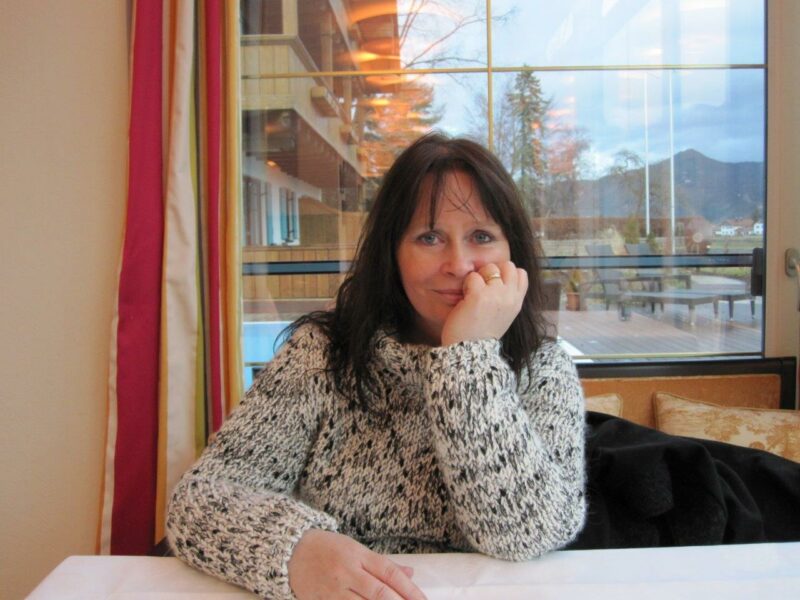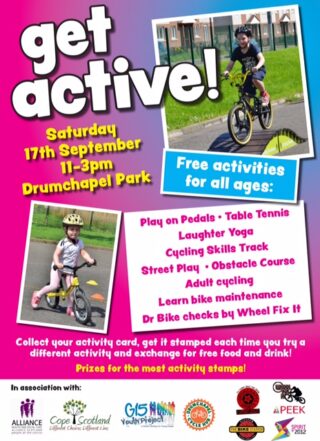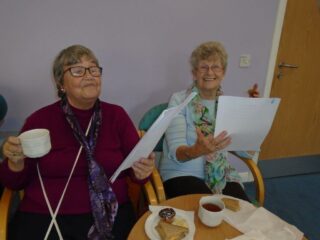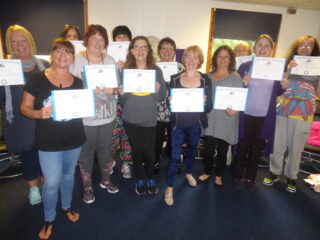Hilda Campbell is Chief Executive of the Glasgow-based charity COPE Scotland, which helps people and families manage the challenges of life which – unaddressed – can lead to mental illness. She shares her improvement journey – which began with the death of her grandmother, when she was a child. Hilda also invites you to contact her if you would like to join Q’s Wellbeing and Quality Health Care Special Interest Group, which plans a webex in April.
 How – and why? – did you first get involved in improvement; and what has been your journey since then?
How – and why? – did you first get involved in improvement; and what has been your journey since then?
Actually this started when I was a child. My grandmother had died in hospital and when we went to collect her belongings they had been thrown into a bin bag. The chocolate gingers I had used my pocket money to buy her were all loose among her night things and this upset me. My thoughts, even at that young age, were that if they cared so little for her things, how much did they care about her. My mum was diagnosed with systemic lupus erythematosus when I was eight and died when I was 15. Back then it was rare – so she was a bit of a human guinea pig. I watched the high doses of steroids do as much damage as the disease and I thought surely there must be a better and kinder way to treat people, people are more than just their disease, this is my mum.
I’m organising a first webex for Q’s ‘Staff Wellbeing and Quality Health Care’ SIG in April
Initially I had dreams maybe of being a biochemist, but this didn’t come to pass. Instead I ended up studying social sciences. I was seeking to understand more not only about human psychology but the institutions and systems which impact on people. I came to the conclusion sociology gave more insight into the human condition than psychology ever could and that there were many changes needed in the world to help reduce suffering and pain.
I wrote an essay in my fourth year – ‘So what is mental illness anyway?’ – and was told I’d passed as I’d given the Psychology Department a laugh with my naïve twaddle. I was also told that I cared too much ever to be an effective clinical psychologist, and my next journey was to train as a psychiatric nurse, as I believed there were better ways of supporting people experiencing mental distress. Again I learned I cared too much ever to be an effective senior nurse manager. Although I should add that the rehabilitation unit I managed I learned had the lowest readmission rates in Scotland.
Does anyone have any assessments they use with people which, as opposed to focusing on the individuals’ problems, also considers the individuals’ assets to address the problems?
So I left, and went to work in the Third Sector. Basically I was given a copy of an urban aid application, a smile and the instruction to get on with it. Our initial budget was £42,000 and we had no premises. We went out and asked everyone what they thought we could do to:
- Be a community-led initiative
- To empower services users
- To reduce referrals to main statutory bodies e.g. health board or social work
- To increase community-led workshops
- To provide access to advice and information

We listened and have continued to listen. Rebel with a cause is a piece written on COPE Scotland as part of the RCN ‘Nursing on the Edge’ campaign.
The journey continues, we are now working with even more partners to explore how using shared decision making, co-design and co-production we can transform not only people’s experiences of mental health support in primary care, but how assets in communities can be nurtured and supported to transform the systems and conditions which can result in mental ill health in the first place. Welfare reform, poverty, inequality are not made better by a medical model alone and people need to be supported to be active in their own recovery, self-management and regeneration of their communities working in partnership with agencies and organisations. How to support the conditions for a kinder world with less ill health, inequality and suffering is easier said than done, but working with others we can make a difference. This is another reason I was drawn to Q as I recognised this was an initiative which also wanted to work with others to make a real difference and help improve people’s health and wellbeing through continuous quality improvement and sharing learning and best practice and working out new solutions together.
Rebel with a cause is a piece written on COPE Scotland as part of the RCN ‘Nursing on the Edge’ campaign
What most inspires you professionally?
For me it’s a person, Florence Nightingale, she saw there was a better way of doing something and despite all the challenges she faced did not give up, here is a link to a piece around catalysts for change we put together for a QNIS. event.
Can you share a hard-won lesson you’ve learnt about what makes for a successful (or unsuccessful) improvement project
There are so many it’s hard to know where to start. Our whole service is based on continuous improvement and working with people with lived experience and also with those who provide services. Maybe one to discuss is issues of power.

Power has a huge part to play in any relationships, and for much of QI it’s about relationships in their broadest sense, relationship between health professional and client, relationship between health professional and management, interpretation of policy, other partners, peers, the list goes on.
When working in a co-design and co-production environment committed to shared decision making this does change the power balance. No longer are the health professionals the sole expert and the client a passive recipient: they are a team working together. Similarly, when management involve health professionals in helping determine strategy and policy along with people with lived experience the traditional hierarchy of authority saying ‘this is what will happen’ goes and is replaced with a more co-operative way of working. Sometimes, this creates a power vacuum as some people are not comfortable, as making joint decisions also involves taking joint responsibility. They are uncomfortable in a landscape where answers are sought together. There are also changes within the systems which affect people around shared decision-making, co-production and design and it’s finding a way we can work together to find solutions and not let power get in the road. Here is a blog post which considers some of these points.

What change could we make that would do most to embed continuous improvement in health and care?
I think it’s all about vision, but also understanding your vision may differ from others’ and where can we find commonality and see what we aim to change from each other’s perspectives. Currently we are involved in a really exciting development with local GP’s from the Deep End and other partners including the Health council in Scotland, Glasgow Centre for Population Health, Community planning, people with lived experience, the Alliance, local community groups and many others.
Some people are uncomfortable in a landscape where answers are sought together.
The Jigsaw Project is a GP-cluster led partnership initiative to co-design new pathways of intervention in mental health. Its aim is to support the health and wellbeing of people and families in Drumchapel and Yoker by improving connections between primary care, mental health services and community assets, and to share the learning across Scotland and beyond. It is a partnership between the Drumchapel and Yoker GP Cluster and their project partner COPE Scotland, and is supported by NHS Greater Glasgow and Clyde with funds provided by the Scottish Government’s Transforming Primary Care Mental Health Initiative.
The Jigsaw Project will seek to facilitate honest and courageous conversations across traditional divides, to try to find solutions to some of the shared challenges being faced
The metaphor of a jigsaw describes not only the multiple complex problems that impact on the mental health of individuals and communities, but also the multiple, often disconnected and confusing, sometimes dysfunctional array of groups, resources and services that exist to try and address these problems. There are no simple solutions to the long-term challenges of improving mental health, particularly in disadvantaged communities. Many different individuals, families, friends, community groups, charities, GPs, mental health services, schools and many more, each hold different pieces of the bigger picture. The Jigsaw Project will seek to facilitate honest and courageous conversations across traditional divides, to try to find solutions to some of the shared challenges being faced. The goal is to take small steps by putting the learning from these conversations into action, with an emphasis on improving connections between mental health services, community assets, local resources and the GP hub, supporting community capacity building and working towards a community network where mental health and wellbeing are better looked after by everyone.
What led you to decide to join Q?
I believe we are stronger when we work together and share information, the Q community gives access to colleagues across the UK all seeking the same: improvements in people’s health and wellbeing by improving people’s experiences of health care. To be part of this community is an honour and a real chance to help make a difference not only for the people we connect with but by sharing what works so others can adopt and adapt and equally we can learn from others to make changes for the better, not just within our own services but across the UK.
The Q community gives access to colleagues across the UK all seeking the same: improvements in people’s health and wellbeing by improving people’s experiences of health care
Can you tell us about new connections (and collaborations) you’ve made as a result of joining the Q community.
We have made stronger links not only with QI work in Scotland but also connected with colleagues across the UK. We have been asked to go and speak to a group in Northern Ireland about co-production and have also been asked more than once to speak about this in Scotland. We can share our experience of being a community-led initiative using principles of co-design, production and shared decision making and we can learn more about formal QI systems which we can adopt and adapt. This has been priceless and we are connecting with people in new ways which would not have been possible without the Q community. The Health Foundation has also been an excellent source of advice and information on so many things which have helped us look at things in new ways. We believe our learning and new way of connecting is what helped us become partners with the Jigsaw Project as we have a greater understanding of some of the challenges larger systems have to transform and the need for improved reporting of transformation through QI.
We also are interested in the wellbeing of staff and the impact staff morale has on quality improvement and service delivery. With colleagues from Q we will be writing a blog on this and from this are keen to set up a hub to look at how staff wellbeing can also be supported and nurtured. Please feel free to contact me if this is of interest hilda@cope-scotland.org also please visit the sharing section of the COPE Scotland website where a variety of wellbeing promotion tools are available free for download.
Can you tell us about something you’re currently working on (that Q members might be able to help with/feed into/learn from/contribute to).
The Jigsaw project: it’s in its early days but as this develops we would be very keen on any help or advice around how we support transformational change. Eg does anyone have any assessments they use with people which, as opposed to focusing on the individuals problems, also considers the individuals’ assets to address the problems.
This has been priceless and we are connecting with people in new ways which would not have been possible without the Q community
Also anyone who can offer advice in how to create conditions which facilitate helpful discussions when people look at the world through different lenses, to enable some commonality to be found people can work forwards from. How do we create safe places where people can share what they think, even be vulnerable and not feel they will be judged or scorned? Quality improvement is a journey along which mistakes can be made, there is no such thing as perfection. If we fear sanction, though, energy can be used in defending why it went wrong, rather than admitting it went wrong and putting energy into what have we learned and what can we do differently next time.
I am really interested in any help or advice on how to support the conditions for healthy collegiate working and managing issues of power and creating the conditions where diverse groups including the community come together to work on some of the wicked problems facing health and health care systems today. I am interested in value-based systems and how we can move from a complex landscape of policies and bureaucracy which overwhelms people – and things can still go wrong – to a simpler landscape of values, ethics and principles. These are core to practice and identifying what needs to change, as the individual and the communities we serve always come first.
I want to work with others to help create something which lasts and mitigates many of the real challenges people face today for their health and wellbeing and the future health and wellbeing of their children, a journey which started when I was a child.
I’m also organising a first webex for the ‘Staff Wellbeing and Quality Health Care’ Q SIG I convene (mentioned in my previous response). This webex will be in April. The topic will focus on getting to know each other and what we want to achieve through the SIG, plus sharing any tools or resources we know of already. This will be a collaboration with the QI Hub in Scotland. Look out for details in the Q events calendar. It will be open to anyone who’s interested, including non-Q members. (Please contact me by 1 April if you’d like to join the webex, which will take place later in the month.)
Coming next: Mandy Rudczenko (Coalition for Collaborative Care).